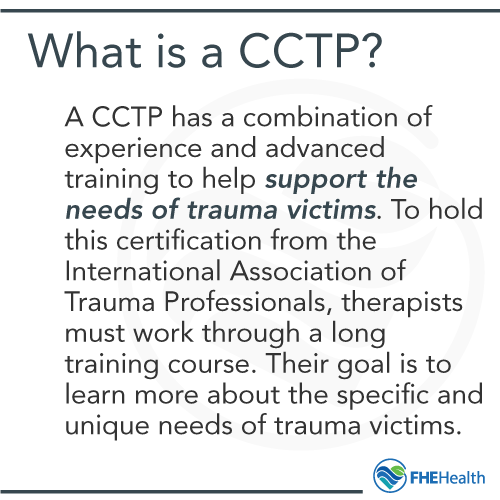
When trauma occurs, treatment is often necessary. Reaching out to the right professional is critical. Many counseling professionals can help you with trauma treatment. However, some patients may benefit from reaching out to a Certified Clinical Trauma Professional (CCTP) for their treatment.
What Is a CCTP?
A CCTP has a combination of experience and advanced training to help support the needs of trauma victims. To hold this certification from the International Association of Trauma Professionals, therapists must work through a long training course. Their goal is to learn more about the specific and unique needs of trauma victims.
Understanding Trauma and How It Is Treated
Trauma is a complex area of mental health. There are various forms of trauma, including psychological and physical. In all cases, a person who’s experienced any type of trauma generally needs a supportive environment to help them to work through the lasting impression it has on them.
Traumatic Stress Disorder
 Post-traumatic stress disorder (PTSD) is one form of trauma. It occurs when an event of some type terrifies a person. This can occur if they witness it happening or experience it firsthand. When an event like this occurs, a person may have difficulty adjusting to and coping with the situation. They may suffer from flashbacks, anxiety and nightmares related to the event. Many times, they suffer from uncontrollable thoughts about what happened and replay it over in their mind.
Post-traumatic stress disorder (PTSD) is one form of trauma. It occurs when an event of some type terrifies a person. This can occur if they witness it happening or experience it firsthand. When an event like this occurs, a person may have difficulty adjusting to and coping with the situation. They may suffer from flashbacks, anxiety and nightmares related to the event. Many times, they suffer from uncontrollable thoughts about what happened and replay it over in their mind.
PTSD can create a lasting impact on a person. They may have trouble maintaining self-care. In some situations, the symptoms of this condition can last years and can make it hard to accomplish day-to-day tasks.
If this sounds like something you are facing right now, trauma treatment is necessary. A CCTP therapist can work with you to explore ways to ease symptoms and improve quality of life. The therapist will conduct a physical and psychological evaluation to diagnose the condition.
Then, a treatment plan is created that addresses the unique needs of the individual. This may include cognitive therapy, exposure therapy or eye movement desensitization and reprocessing. With advanced training in trauma treatment, a CCTP therapist can help the individual to work through this difficult process in a more effective manner using innovative approaches and treatments.
What Type of Experience and Requirements Are Necessary to Become a CCTP?
To become a CCTP, individuals must work through a series of steps. They include:
- Complete training through an approved course. This generally will include core competencies of trauma and treatment options.
- In-person or remote training may be obtained through a number of different resources. The International Association of Trauma Professionals outlines which programs are approved.
- Then, the therapist will apply for the title and certification.
To be a CCTP, individuals have to be a current mental health professional with an active license. In some cases, graduate students can also apply as they are completing their education.
What Other Certifications Do Trauma Treatment Counselors Hold?
There are numerous types of certifications for trauma-related therapists. Each one is set by a different organization and may have unique requirements. There are two approaches to this type of training. One is a model-specific certification. These certifications ensure a licensed therapist has the ability to provide care through that specific type of treatment process. The second is general trauma certifications. These provide a high level of degree completion meant to provide a broader level of support.
Some examples of model-specific certifications include:
- Child and Family Traumatic Stress Intervention (CFTSI) for masters-level therapists
- Cognitive-Behavioral Intervention for Trauma in Schools (CBITS) for those who have a master’s or doctoral degree in a clinical field
- Eye-Movement Desensitization and Reprocessing skill training
- Child-Parent Psychotherapy treatment
- Trauma-Focused Cognitive Behavioral Therapy (TF-CBT)
Some examples of clinical professional trauma certifications include:
- Certified Trauma Treatment Specialist (CTTS)
- Certificate in Trauma Therapy (CTT)
- Certificate Program in Traumatic Stress Studies
- Certified Expert Trauma Professional
- Advanced Certified Trauma Practitioner (ACTP)
Each degree program requires an individual to obtain specific course education. Sometimes, there is a requirement to be a member of a specific association or to have a certain number of hours treating patients with specific types of trauma. Ultimately, the goal is to have experience in areas many patients need support in to provide this level of care.
Do You Need to Seek Trauma Care from a Professional?
With so many professionals available, it can seem overwhelming to seek out help for trauma. If you or your loved one is dealing with trauma at any level, seeking any professional with trauma-related treatment skills can be a life-changing experience.
If you are a parent or spouse of someone who experienced trauma in some form, assume that they need professional help to manage their situation. The complications of trauma exposure can last for years, leading to hiding, difficulty coping, complicated mental health problems and long-term stress. Even if they seem okay after such an event, it’s best to schedule a consultation with a CCTP.
You should seek our trauma-related treatment if:
- You experienced some type of traumatic event that replays in your mind or something you cannot face.
- You witnessed a traumatic event occurring to your loved one.
- You or your loved one were exposed to the graphic details of a traumatic event, such as watching someone die.
- You are struggling with managing day-to-day tasks because of anxiety or concern over the traumatic event.
- Your child, who experienced trauma in some form, is struggling with school.
Trauma in all forms can impact relationships and change a person’s outlook. With the help of a CCTP therapist, it is possible to find support. Often, one-on-one counseling with a therapist can help determine the best course of action for your situation. This may include one or more treatment options meant to help you see the reality of what you are facing.
A CCTP therapist has the goal of helping you to work through the trauma. They understand the importance of not further exposing you to the event, though. This can be a difficult line to walk, which is why a licensed and certified trauma therapist is the better option for many people.
Getting the Trauma Care You Need at FHE Health
Mental health problems, including trauma-related events, require immediate attention from a well-qualified therapist. At FHE Health, we can help you or your family member to get the help they need. Speak to our compassionate, experienced counselors with proper certifications by calling 833-596-3502 24/7 for care.






